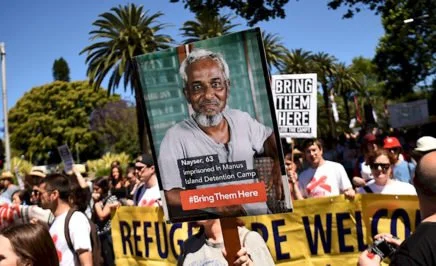US authorities must put an immediate end to both the separation and detention of children and families who come to the US border with Mexico seeking asylum, while also immediately reuniting the thousands of families who remain separated as a result of the Trump administration’s unlawful and damaging policies, said Amnesty International.
“Despite the executive order that President Trump signed last week, thousands of frightened children are still being kept apart from their distraught parents, who have no idea when they’ll see them again. By holding kids in cages or flying them to shelters thousands of miles away, the US authorities are deliberately inflicting deep and lasting mental suffering on them in a bid to deter desperate families from seeking asylum,” said Erika Guevara-Rosas, Americas Director at Amnesty International.
“By holding kids in cages or flying them to shelters thousands of miles away, the US authorities are deliberately inflicting deep and lasting mental suffering on them in a bid to deter desperate families from seeking asylum.”
Erika Guevara-Rosas, Americas Director at Amnesty International.
“President Trump’s order to imprison children with their parents instead of separating them is just substituting one traumatic punishment with another. The US authorities must immediately release those families seeking asylum and respect their rights to apply for asylum in fair and humane conditions. No child should be taken from their parents’ arms or be made to grow up behind bars. It’s time to end the inhumane practices of family separation and detention once and for all.”
In the executive order signed on 20 June, President Trump mandated that children be incarcerated with their parents in immigration detention centres while their asylum claims are processed. To implement the order, which conflicts with US law, the government is seeking an exemption from the court-ordered Flores Settlement Agreement that mandates that children should be released from detention without delay and within no more than 20 days.
The Department of Homeland Security (DHS) has since issued a series of statements making clear that family separations could continue for the foreseeable future, including while asylum seekers await the outcome of their requests. While authorities have announced the intent to reunite some of the already-separated families, reunifications have been few, and many families remain traumatized, separated and under threat of deportation without access to a fair and humane asylum process.
The preliminary injunction by a US federal court ordering the reunification of the thousands of forcibly separated children and parents on 26 June is a welcome development, although the Trump administration could still contest this order. Public pressure is critical to ensure that the administration does not reunify the families only to detain them and return to forcible separation while challenging the court order or in future.
Although the Trump administration only formally announced the separation of families as a deterrent measure under the “zero-tolerance policy for criminal illegal entry” on 6 April 2018, Amnesty International has found that this practice has been in use since at least the beginning of the administration, including against people who presented themselves at ports of entry to exercise their right to apply for asylum.
The DHS said on June 19 that it had separated 2,342 children from 2,206 parents at the US-Mexico border from May 5 to June 9 under the “zero-tolerance policy”. Official statistics obtained by news media suggest that thousands more families may have been separated by the US government even prior to this policy.
“The families seeking asylum are fleeing terrible violence in their home countries and simply want to raise their children in safe and humane conditions.”
“The families seeking asylum are fleeing terrible violence in their home countries and simply want to raise their children in safe and humane conditions. The idea that children can be protected by locking them up or separating them from their parents defies all sense of logic and humanity. These unbelievably cruel practices are unlawful and will leave a permanent stain on the USA’s human rights record,” added Erika Guevara-Rosas.
Amnesty International calls on the US Congress to press the DHS to reunite, as quickly as possible, those families that have been separated, put an immediate end to the forced separation of children from their parents or guardians and ensure that it does not resume.
Congress must also push the government to end the practice of detaining families that are seeking asylum, immediately release together the parents and children in detention, and reject any increase in funding for immigration detention facilities for children and families.
Accounts of forced separation
Amnesty International researchers visited the US-Mexico border in April and May 2018 to document the treatment of asylum seekers. In the majority of cases of family separations that the organization documented, the families had presented themselves lawfully at official border crossings in order to seek asylum, and US authorities offered them no justification for the separations.
In one case, a 39-year-old Brazilian woman and her seven-year-old son fled their home country after receiving repeated death threats from gang members, whom she had denounced for dealing drugs in front of her home. The gang members were collaborating daily with local police and said they would kill Maria and her son no matter where they fled to in Brazil.
Speaking to Amnesty International at an immigration detention centre in Texas, she said Customs and Border Protection (CBP) agents eparated her from her son without giving any reason the day after they requested asylum at an official port of entry in March 2018.
“They told me: ‘you don’t have any rights here, and you don’t have any rights to stay with your son,’” she said, in tears. “I died at that moment. It would have been better if I had dropped dead… Not knowing where my son was, what he was doing. It was the worst feeling a mother could have. How can a mother not have the right to be with her son?”
In another case, a 63-year-old woman from Honduras told Amnesty International that gang members threatened to kill her and her 14-year-old granddaughter and burn down their home. They fled Honduras immediately, having known of others who had been killed by the gang after seeking assistance from police or moving to other parts of the country.
After more than a year in a detention centre in Texas, the woman told Amnesty International that CBP agents separated her from her granddaughter two days after they sought asylum at a port of entry in Texas:
“They didn’t tell me why they were taking her. They just told me they were going to separate her from me. If they send me back, what am I going to do? I’m going to die in Honduras,” she said. “I’m 63 years old and I just can’t take it anymore. There are days that I’m very desperate and sad. It’s been a very long time I haven’t seen my family.”
Many parents who were forcibly separated from their children showed extreme anguish, weeping uncontrollably at points while recounting their stories to Amnesty International. The organisation found in cases it documented that the forced separation of families, with the stated aim of deterring and punishing asylum seekers requesting protection at US borders, meets the definitions of torture under US and international law.



